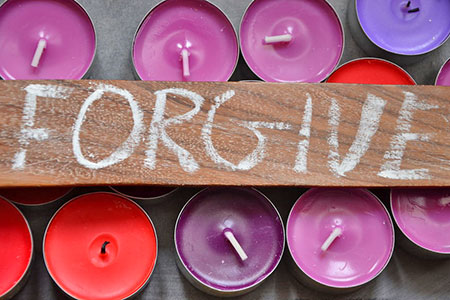revenge
The Divine Justice Of Karmic Lessons
 We sometimes feel we have been wronged by others in some awful way, and then we wonder if the perpetrators will get their ‘come uppance’ or ‘just deserts.’ We wish to know if divine justice will be served upon them.
We sometimes feel we have been wronged by others in some awful way, and then we wonder if the perpetrators will get their ‘come uppance’ or ‘just deserts.’ We wish to know if divine justice will be served upon them.
Sometimes we are so upset or angry that we would like to see this retribution happen immediately and right before our very eyes. In these emotional moments we are out for revenge and want to see the other person reap what they’ve sown. We believe it may bring us some peace that justice has finally been done.
As a youngster, I often heard my mother refer to it as “The Law of Return,” suggesting that whatever we put out there, both good and bad, will always come back to us. She would say that it always comes back to us tenfold!
There are also spiritual teachings and wisdom traditions that suggest if we don’t learn our lessons and correct our mistakes in this lifetime, it will become karmic in the next. It further suggests that we eventually will experience whatever harm or wrongdoing we have imposed upon others in our own life, sometimes for several lifetimes, until we’ve truly learned our lesson.
So, will others get what’s coming to them for the pain and suffering they have caused us? It’s my experience that this is rarely the case, but from evidential mediumship messages, I am convinced that a life review, when we reach the other side, is inevitable. The soul who has hurt someone else, will be held accountable and will feel what the other person felt very intensely.
I do know from spirit messages that have come through from certain relatives and family members on the other side, that they have relived what I had felt when they were harsh towards in this life. Spirit often comes through with messages of guilt, remorse and regret. The aim is usually to seek healing and forgiveness.
Escaping Karma
 Karma is often one of the most misunderstood spiritual experiences that we have as humans. People will often use the word ‘karma’ to represent something punitive, or to point out that another person will “get what’s coming to them.”
Karma is often one of the most misunderstood spiritual experiences that we have as humans. People will often use the word ‘karma’ to represent something punitive, or to point out that another person will “get what’s coming to them.”
But looking at karma through the lens of retribution is almost the opposite of the reason why karma actually exists. In fact, when we hold a perspective about karma that is punitive, we tend to create some sticky karma for ourselves in the process.
Karma is in truth an expression of the self-correcting Universe, reflecting its intelligent, loving design. The goal of karma is to expand a person’s awareness of love, joy, and serenity. Karma simply means that whatever we give out, comes back to us multiplied.
The concept of “karma is going to get that person,” is often directly associated with personal vendetta. Therefore, so many spiritual teachers throughout history talked about forgiveness and loving our enemies. When we focus on karma “getting” the other person, we tend to bring about harsh justice for ourselves.
It is also important to understand that the karma that other people experience is not proportional to how offended we are. The goal of karma is not to ‘make’ other people feel the way that we felt when we were offended.
Resentment And The Empath
 Do you have a tendency to re-experience past injustices — real or perceived – while holding on to those old feelings of anger connected to them? If so, it means you are harboring some form of resentment. Empaths are especially prone to resentment, simply because we tap into emotions, past, present, and future, much more than most people.
Do you have a tendency to re-experience past injustices — real or perceived – while holding on to those old feelings of anger connected to them? If so, it means you are harboring some form of resentment. Empaths are especially prone to resentment, simply because we tap into emotions, past, present, and future, much more than most people.
Resentment forms when we become angry towards a person or situation, and then hold onto that anger. Some people harbor their resentments for many years, refusing to let go of it. Over time, whatever caused the original anger and initially led to the resentment, may be forgotten, but the resentment remains. It is like a still-smoldering ember left after the flames of a fire have subsided. The fire no longer rages, but the ember remains smoldering, and all it takes is a spark to set that fire raging again.
For the empath this rekindled ‘fire’ may be triggered every time they enter a new relationship. No harm has been done, yet, but the empath may be so on guard, and overly vigilant to any slight that resembles their past hurt, that it easily sets off another destructive blaze. They expect the worst and try to protect themselves against it, but in the process the thing they fear the most may re-emerge from the past, unhealed resentment.
For many empaths, lack of boundaries also lead to dashed expectations, typically followed by resentment. As an empath, you feel the heart of the person, and know that there is love. Once connected into the, “I know they love me,” their bad behavior can be overlooked. Continue reading
To Fester, Or Forgive
 Recently, a peer did a short talk on forgiveness, as part of a healing service. Besides her being courageous, sharing aspects of her personal challenges with parents and peers, she also offered a reminder of how instrumental forgiving ourselves is in our healing journey.
Recently, a peer did a short talk on forgiveness, as part of a healing service. Besides her being courageous, sharing aspects of her personal challenges with parents and peers, she also offered a reminder of how instrumental forgiving ourselves is in our healing journey.
The reptilian, primitive part of the brain has a default state of always monitoring its environment. The hunter-gatherer ancestral days had us on constant alert. Anxious. Awaiting possible threat by the saber-tooth tiger. But our modern brain has evolved such, that when we are not active in a task, the brain occupies itself with dwelling on the past.
The idle brain tends to ponder past events and unpleasant thoughts, that in the default state, fill us with anxiety. Pain. Guilt. Self-blame. Shame. Anger. Disappointment.
The typical memories and thoughts, that can consume us in this default state, vary. Some are large and life-changing, such as the loss of a loved one or favorite pet, financial loss, divorce, adultery, retrenchment, and physical or emotional abuse. Others are more behavioral or emotional, but can be just as debilitating.
When our life is ‘heading south’ and we cannot seem to turn things around, we tend to replay the situation. This can lead to becoming more depressed, and having more reason to doubt ourselves. A vicious cycle can result. We spin and spin…like laundry in the dryer, being tumbled. If we remain in that dryer, resentment sets in.
Free Yourself With The Power Of Forgiveness
 How can we possibly reconcile the feelings of anger and betrayal with a need to forgive? Are we compromising our integrity in doing so?
How can we possibly reconcile the feelings of anger and betrayal with a need to forgive? Are we compromising our integrity in doing so?
Forgiveness can seem like an impossibility… but it doesn’t have to be. It’s really one of the few things in life that really matters, whether it means forgiving ourselves, or someone else. It is said that allowing someone to continuously upset you, is to allow them to ‘live rent-free inside your mind.’
Others hurt us all the time. Holding on to this hurt for long periods of time can damage us physically and psychologically. And then there are those ‘little things’… like someone cutting you off in traffic, or forgetting an important date.
One thing forgiveness does not do, is make us forget the source of the pain. What it does is allow a reconciliation with what happened, and allows us to move on in a productive way. When you were a child, perhaps you got hurt with a hot stove burner or electrical outlet. You didn’t (hopefully) spend the rest of your life being angry at stoves or electrical outlets! This is basically how forgiveness also works. We can acknowledge that someone or something caused us to hurt, and be aware of how that happened, but still move past it and get on with our lives.
Holding on to anger and bitterness will color all your relationships, until you learn to forgive and let go. If, for example, you ended a toxic relationship and decided to start dating again, you might not be able to fully trust, because of the possibility of reliving that pain. A truly intimate relationship will never happen without forgiveness.
